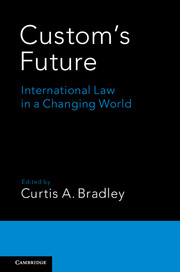Book contents
- Frontmatter
- Dedication
- Contents
- Notes on Contributors
- Introduction: Custom's Future
- 1 Custom's Past
- 2 Customary International Law Adjudication as Common Law Adjudication
- 3 Customary International Law as a Dynamic Process
- 4 Custom, Jus Cogens, and Human Rights
- 5 Customary International Law: How Do Courts Do It?
- 6 Custom's Method and Process: Lessons from Humanitarian Law
- 7 The Growing Obsolescence of Customary International Law
- 8 The Strange Vitality of Custom in the International Protection of Contracts, Property, and Commerce
- 9 The Decline of Customary International Law as a Source of International Criminal Law
- 10 Customary International Law and Public Goods
- 11 Reinvigorating Customary International Law
- 12 The Evolution of Codification: A Principal-Agent Theory of the International Law Commission's Influence
- 13 Custom and Informal International Lawmaking
- 14 Custom's Bright Future: The Continuing Importance of Customary International Law
- Bibliography
- Index
7 - The Growing Obsolescence of Customary International Law
Published online by Cambridge University Press: 05 February 2016
- Frontmatter
- Dedication
- Contents
- Notes on Contributors
- Introduction: Custom's Future
- 1 Custom's Past
- 2 Customary International Law Adjudication as Common Law Adjudication
- 3 Customary International Law as a Dynamic Process
- 4 Custom, Jus Cogens, and Human Rights
- 5 Customary International Law: How Do Courts Do It?
- 6 Custom's Method and Process: Lessons from Humanitarian Law
- 7 The Growing Obsolescence of Customary International Law
- 8 The Strange Vitality of Custom in the International Protection of Contracts, Property, and Commerce
- 9 The Decline of Customary International Law as a Source of International Criminal Law
- 10 Customary International Law and Public Goods
- 11 Reinvigorating Customary International Law
- 12 The Evolution of Codification: A Principal-Agent Theory of the International Law Commission's Influence
- 13 Custom and Informal International Lawmaking
- 14 Custom's Bright Future: The Continuing Importance of Customary International Law
- Bibliography
- Index
Summary
Consider the great modern challenges to international society: global environmental protection, international public health, cybersecurity, financial crisis, and liberalization of movement of goods, services, and people. As will be explained in detail, it is unimaginable that customary international law (CIL) can provide effective mechanisms by which to address these challenges. Consider also some of the longer-term challenges: suppressing and regulating war, protecting human rights, and reducing poverty. While CIL has played an important role in regulating war and protecting human rights, this chapter argues that it has now done about all that it can do in those areas. It is time to focus the world's attention on more effective mechanisms by which to address all of these challenges. These more effective mechanisms will include treaty-based hard law and soft law.
CIL has not been around forever, and it responded to particular historical circumstances. While CIL had roots in Roman law, and while an early mention of a variant of modern CIL was contained in Francisco Suarez's De Legibus ac cleo legislatore, in 1612, Hugo Grotius is considered to have articulated the modern version of CIL later in the seventeenth century. CIL doctrine has changed over time since then, and there is no reason to think that it will not change in the future, and even that it will not be superseded by other mechanisms for international cooperation.
The demands made of international law up until the latter part of the twentieth century were quite different from those in view today. The law of coexistence, in Wolfgang Friedmann's dichotomy, provided the basis for diplomatic interaction that allowed for informal – nonlegal – give and take. As Friedmann explained in his seminal 1964 work, The Changing Structure of International Law, “The principal preoccupation of the classical international law, as formulated by Grotius and the other founders, was the formalization, and the establishment of generally acceptable rules of conduct in international diplomacy.” Note that these were formal rules designed to facilitate informal interaction. They formalized the process of diplomacy, not the substance of international cooperation. The law of coexistence was largely established by CIL. In the law of coexistence, states were equal, their interests were the same, and the rules did not need to change much to face new problems. CIL served these purposes reasonably well.
- Type
- Chapter
- Information
- Custom's FutureInternational Law in a Changing World, pp. 172 - 204Publisher: Cambridge University PressPrint publication year: 2016
- 4
- Cited by



